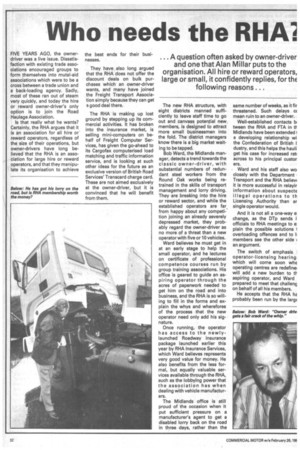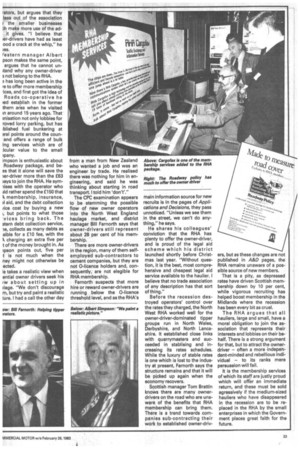Who needs the RHA1
Page 34

Page 35

If you've noticed an error in this article please click here to report it so we can fix it.
... A question often asked by owner-driver and one that Alan Millar puts to the organisation. All hire or reward operators, large or small, it confidently replies, for thE following reasons...
FIVE YEARS AGO, the ownerdriver was a live issue. Dissatisfaction with existing trade associations encouraged groups to form themselves into mutal-aid associations which were to be a cross between a trade union and a back-loading agency. Sadly, most of these ran out of steam very quickly, and today the hire or reward owner-driver's only option is to join the Road Haulage Association.
Is that really what he wants? Certainly, the RHA argues that it is an association for all hire or reward operators, regardless of the size of their operations, but owner-drivers have long believed that the RHA is an association for large hire or reward operators, and that they manipulate its organisation to achieve the best ends for their businesses.
They have also long argued that the RHA does not offer the discount deals on bulk purchases which an owner-driver wants, and many have joined the Freight Transport Association simply because they can get a good deal there.
The RHA is making up lost ground by stepping up its commercial activities. It has broken into the insurance market, is selling mini-computers on behalf of Freight Computer Services, has given the go-ahead to its Cargofax computerised load matching and traffic information service, and is looking at such other ideas for the future as an exclusive version of British Road Services' Transcard charge card. These are not aimed exclusively at the owner-driver, but it is convinced that he will benefit from them. The new RHA structure, with eight districts manned sufficiently to leave staff time to go Out and canvass potential new members, is designed to attract more small businessmen into the fold. The district managers know there is a big market waiting to be tapped.
Bob Ward, the Midlands manager, detects a trend towards the classic owner-driver, with substantial numbers of redundant steel workers from the Round Oak works being retrained in the skills of transport management and lorry driving. They are breaking into the hire or reward sector, and while the established operators are far. from happy about any competition joining an already severely depressed market, they probably regard the owner-driver as no more of a threat than a new operator with five or 10 vehicles.
Ward believes he must get in at an early stage to help the small operator, and he lectures on certificate of professional competence courses run by group training associations. His office is geared to guide an aspiring operator through the acres of paperwork needed to get him on the road and into business, and the RHA is so willing to fill in the forms and explain the whys and wherefores of the process that the new operator need only add his signature.
Once running, the operator has access to the newlylaunched Roadway insurance package launched earlier this year by RHA Insurance Services, which Ward believes represents very good value for money. He also benefits from the less formal, but equally valuable services available through the RHA, such as the lobbying power that the association has when dealing with vehicle manufacturers.
The Midlands office is still proud of the occasion when it put sufficient pressure on a manufacturer's agent to get a disabled lorry back on the road in three days, rather than the same number of weeks, as it fir threatened. Such delays mean ruin to an owner-driver.
Well-established contacts bi tween the RHA and FTA in tF Midlands have been extended I a developing relationship wi the Confederation of British I dustry, and this helps the hauli get his case for increased rati across to his principal custor ers.
Ward and his staff also wo closely with the Department Transport and the RHA believr it is more successful in relayir information about suspecte illegal operations to th Licensing Authority than ar single operator would.
And it is not all a one-way ra change, as the Dip sends i. officials to RHA meetings to e: plain the possible solutions overloading offences and to members see the other side an argument.
The switch of emphasis i operator-licensing hearing! which will come soon whe operating centres are redefine, will add a new burden to th aspiring operator, and Ward prepared to meet that challeng on behalf of all his members.
He accepts that the RHA ha probably been run by the largt rators, but argues that they less out of the association the smaller businesses Th make more use of the ad it gives. "I believe that er-drivers have had as least ood a crack at the whip," he ies.
restern manager Albert pson makes the same point, argues that he cannot unland why any owner-driver s not belong to the RHA.
a has long been active in the re to offer more membership ices, and first got the idea of Roads co-operative he led establish in the former them area when he visited in around 15 years ago. That inisation not only lobbies for roved lorry parking, but has 'Wished fuel bunkering at 3ral points around the counand offers a range of bulk ing services which are of icular value to the small
Impson is enthusiastic about Roadway package, and bees that it alone will save the ler-driver more than the £63 )ays to join the RHA. He symlises with the operator who ild rather spend the £150 that 1. membership, insurance, II aid, and the debt collection /ice cost by buying a new ;, but points to what those vices bring back. The stern debt collection service, le, collects as many debts as sible for a £10 fee, with the k charging an extra five per t of the money brought in. As ipson points out, five per t is not much when the ney might not otherwise be ected.
le takes a realistic view when ential owner drivers seek his 1w about setting up in liege. "We don't discourage m, but try and paint a realistic ture. I had a call the other day from a man from New Zealand who wanted a job and was an engineer by trade. He realised there was nothing for him in engineering, and said he was thinking about starting in road transport. told him 'don't'."
The CPC examination appears to be stemming the possible flow of new owner operators into the North West England haulage market, and district manager Bill Farnorth says that owner-drivers still represent about 28 per cent of his membership.
There are more owner-drivers in the region, many of them selfemployed sub-contractors to cement companies, but they are not 0-licence holders and, consequently, are not elegible for RHA membership.
Farnorth suspects that more hire or reward owner-drivers are running below the 0-licence threshold level, and as the RHA's
main information source for new recruits is in the pages of Applications and Decisions, they pass unnoticed. "Unless we see them in the street, we can't do anything," he says.
He shares his colleagues' conviction that the RHA has plenty to offer the owner-driver, and is proud of the legal aid scheme which his district launched shortly before Christmas last year. "Without question, it is the best, most comprehensive and cheapest legal aid service available to the haulier. I believe that no trade association of any description has that sort of thing."
Before the recession destroyed operators' control over the rates they charged, the North West RHA worked well for the owner-driver-dominated tipper groups run in North Wales, Derbyshire, and North Lancashire. It established close links with quarrymasters and succeeded in stablising and increasing its rates schedules. While the luxury of stable rates is one which is lost to the industry at present, Farnorth says the structure remains and that it will be picked up again when the economy recovers.
Scottish manager Tom Brattin knows there are many ownerdrivers on the road who are unaware of the benefits that RHA membership can bring them. There is a trend towards companies sub-contracting their work to established owner-driv ers, but as these changes are not published in A&D pages, the RHA remains unaware of a possible source of new members.
That is a pity, as depressed rates have driven Scottish membership down by 10 per cent, while vigorous recruiting has helped boost membership in the Midlands where the recession has been every bit as cruel.
The RHA argues that all hauliers, large and small, have a moral obligation to join the as sociation that represents their interests and lobbies on their behalf. There is a strong argument for that, but to attract the ownerdriver — often a more independent-minded and rebellious individual — to its ranks mere persuasion will fail.
It is the membership services of which its staff are justly proud which will offer an immediate return, and these must be sold agressively if the medium-sized hauliers who have disappeared in the recession are to be replaced in the RHA by the small enterprises in which the Government places great faith for the future.
















































































